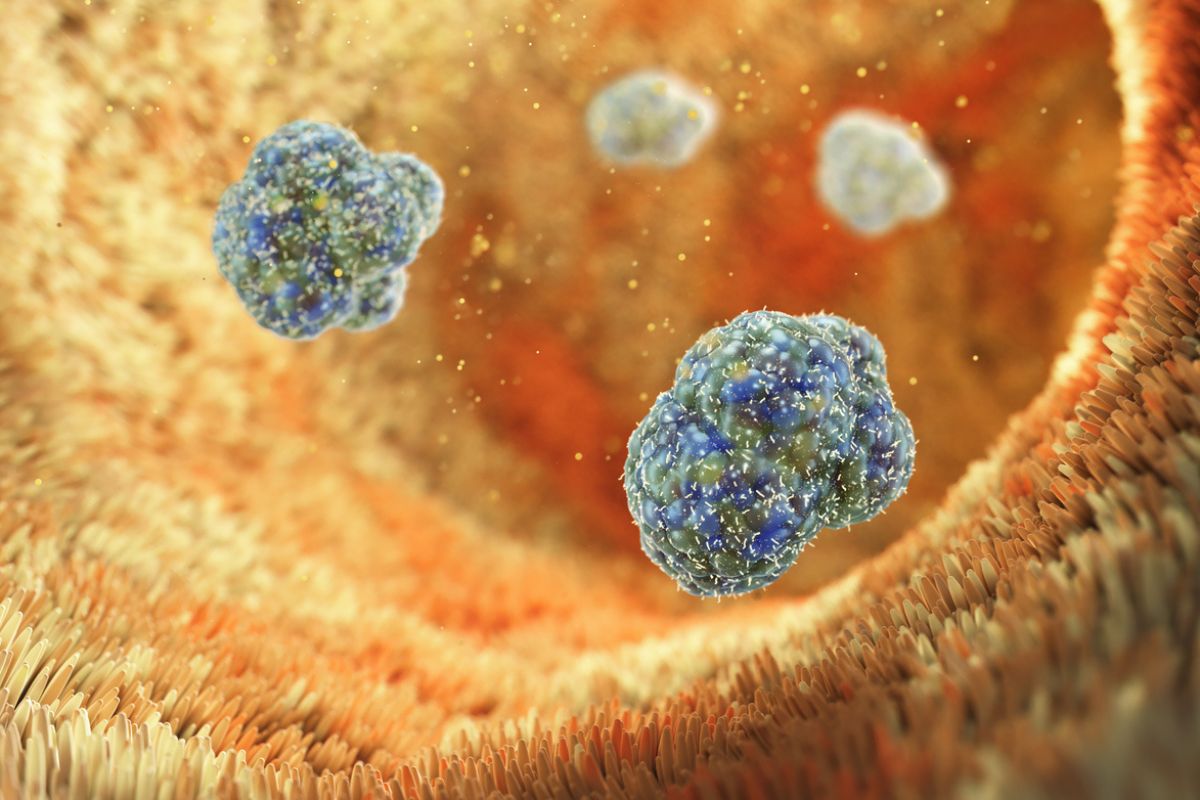The yogurt companies would have you believe that the discovery of the gut microbiome — and how it influences our well-being — is a recent one. But scientists have known about it since at least the 1880s. That’s when German pediatrician Theodor Escherich wrote about what he dubbed the “bacterium coli commune.”
That discovery drove further research and even some successful approaches to treatment for multiple health problems. But it would take decades for scientists to fully appreciate the body’s own bacteria.
The 2012 publication of the first results from the Human Microbiome Project reignited interest in the microbes that live inside us. The most startling discovery? The fact that bacteria far outnumber the cells in our body. The microbiome provides anywhere between 2 million to 20 million genes to the human genome. That dwarfs the 20,000 our own cells contribute.
“Humans don’t have all the enzymes we need to digest our own diet,” Lita Proctor, Ph.D., NHGRI’s HMP program manager, said at the time. “Microbes in the gut break down many of the proteins, lipids and carbohydrates in our diet into nutrients that we can then absorb. Moreover, the microbes produce beneficial compounds, like vitamins and anti-inflammatories that our genome cannot produce.”
Growing interest hit another milestone in 2013. Researchers cut short a clinical trial treating Clostridium difficile infection after fecal transplants from healthy donors outperformed traditional antibiotics. This revelation ushered in a new wave of research into treatments focused on microbes.
The following studies represent some of the more significant advances in our understanding of this relationship.
Study 1: The Gut’s Role in Mental Health
Emerging research underscores the seemingly unlikely way our gut microbiome plays a part in conditions such as schizophrenia. That being said, most of the established research has largely overlooked the influence of lifestyle factors.
One of the most recent studies, appearing in JAMA Psychiatry, takes a closer look at several links between gut microbiome diversity and schizophrenia. More specifically, the researchers explored multiple factors – diagnosis, treatment resistance, and clozapine response – while accounting for demographic and lifestyle factors.
The case-control study looked at data from 97 adults aged 20 to 63, using stool samples and shotgun metagenomics. The researchers split the study participants up into four groups:
- Individuals without psychiatric diagnoses (the control group).
- Those with treatment-responsive schizophrenia taking non-clozapine antipsychotic medications.
- Individuals with treatment-resistant schizophrenia who respond to clozapine.
- And, finally, those with treatment-resistant schizophrenia who don’t respond to clozapine.
The study exposed notably less microbial richness in those with schizophrenia compared to the control group. The data linked distinct microbiome variations to both treatment resistance and clozapine exposure.
The findings suggest that clozapine might induce gut microbiome changes. However, preexisting microbiome differences could also play a part in treatment resistance.
“This is the first study to investigate the gut microbiome in relation to treatment response and treatment resistance in schizophrenia,” lead author and University of Queensland PhD student Svetlina Vasileva explained. “Unlike some previous studies, we also adjusted for factors commonly confounded with schizophrenia and gut microbiome composition, including lifestyle factors like diet, physical health, and medications.
“Our study provides novel insight in the field, suggesting that lifestyle factors, specifically medication intake, might have a larger influence on the gut microbiome of individuals with schizophrenia than the onset and development of the disorder itself. This means that future studies investigating the relationship between the gut microbiome and psychiatric disorders should also aim to collect such data.”
The study’s authors stressed the need to consider lifestyle and medication effects in subsequent studies to get a better grasp of the gut-brain connection in schizophrenia.
Study 2: The Gut Microbiome Barometer
This recent development builds on earlier research that identified dramatic differences in the gut composition of schizophrenia (SCZ) and healthy control (HC) patients. These findings hint at the gut’s potential role as a biomarker.
In this 2021 study, researchers examined the gut microbiota of more than three dozen patients with SCZ and compared them to 20 healthy individuals. The analysis exposed clear microbial “signatures” associated with illness status and the ability to respond to treatment.
The study results showed less diversity in the gut microbiota of the SCZ patients. For example, bacteria such as Haemophilus didn’t appear in the SCZ patients, but the researchers found it in the control patients.
Additionally, the treatment-resistant schizophrenia (TRS) patients showed unique microbial patterns – such as higher levels of pro-inflammatory bacteria like Porphyromonas – while responsive patients boasted a plethora of butyrate-producing bacteria such as Flintibacter butyricus.
The study also identified distinct gut microbiota profiles based on the type of antipsychotic medication the patients were taking. Those on atypical antipsychotics showed higher levels of anti-inflammatory bacteria, such as Faecalibacterium prausnitzii, versus those on more traditional antipsychotics, who boasted higher levels of beneficial and pathogenic bacteria.
These findings suggest gut microbiota could operate as a crucial part of the gut-brain axis, influencing the neurobiological underpinnings of SCZ and its treatment responses.
Admittedly, the study is exploratory. But the authors point out that it speaks to the potential of pursuing tailored treatments targeting the gut.
Study 3: Clozapine Response
In 2023, a team of scientists working out of China launched a research project to explore how gut microbiota might influence the metabolic side effects that plague patients on clozapine. The group sought to glean fresh insight into the delicate interactions between schizophrenia, clozapine, and metabolic health.The researchers examined the gut microbiota of 61 long-term schizophrenia patients on clozapine monotherapy. The team classified participants into subgroups based on gender and the presence of metabolic syndrome (MetS). Using 16S rRNA sequencing technology, the researchers analyzed gut microbiota diversity and its relationship with glucose and lipid metabolic markers.
The data showed:
- Significant differences in gut microbiota diversity between patients with and without MetS.
- Gender played an outsized role in shaping the relationship between specific gut bacteria and metabolic markers. For example, the bacterium Gemmiger showed opposing correlations with lipid levels in males and females.
- Oscillibacter consistently showed a connection to glycemic and lipid indicators. But Bifidobacterium, typically considered a probiotic, surprisingly showed pathogenic behavior in female patients without MetS.
This study is the first to examine the gut microbiota of schizophrenia patients taking clozapine in relation to MetS. The findings further highlight the complexity of metabolic abnormalities associated with clozapine. They suggest that gut microbiota—and its interaction with gender—could play a role that warrants further investigation.
Moving Forward
All three of these studies – which represent only a handful of the research that’s emerging almost daily – offer hope. It will almost certainly inform new approaches to managing schizophrenia, more tailored intervention strategies, and even groundbreaking new drug development aimed at mitigating some of the more challenging side effects that come with treatment.
Further Reading
Unified Brain Network Links Schizophrenia Atrophy



